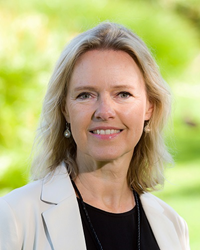
Take the Employee Experience Survey 2025: ‘Help us find opportunities to improve’
How satisfied are you with your work? And how can we improve? On Tuesday 6 May, our partner Welliba will invite you to take our 2025 Employee Experience Survey. We want your opinions on your workload, a respectful culture and more.
Rector Magnificus Hester Bijl, Dean Koen Caminada (FGGA) and Executive Director (Faculty of Humanities) explain why we should all take the survey and what was done with the results of the last survey, from 2022.

Why should we take the Employee Experience Survey?
‘To give us a better idea of what is needed. We want to be a good employer and find out how we can make the right choices to create a positive work environment. However, many of us are worried about the cuts, and some are already feeling the effects. How is that affecting people, and what else is going on? What do we want to keep doing and how can we improve? The results of a survey like this show how we are doing.
We need a 50% response at least because we are legally obliged to carry out surveys on the staff workload and a respectful culture. You will also be asked about your working conditions, well-being, collaboration, communication, career development and leadership.’
The Employee Experience Survey is the successor to the 2022 Personnel Monitor. What happened with the results of that survey?
‘The 2022 Personnel Monitor led to improvements to the staff workload, our onboarding and creating a respectful culture. The Executive Board set up the workload reduction fund together with the University Council, for example. This has funded eight different projects: on AI workshops and more efficient research participant recruitment, for example.
With regard to a respectful culture, our President, Annetje Ottow, has created an action plan with central HR. The information on our staff website has been optimised to make it clearer where you can turn for what. We’ve expanded our network of confidential counsellors, and the Active Bystander workshops have increased people’s awareness of what constitutes acceptable and unacceptable behaviour. And managers and staff are using our skills training, such as A good conversation and peer feedback on how to have a good dialogue and speak up.
More onboarding sessions are being held for new staff to help them integrate faster and have a softer landing at the university. An introduction programme has been developed for new managers too.
So take the 2025 Employee Experience Survey. Your opinion will help give us a full picture of staff satisfaction and make better decisions. This applies not only to the university as a whole but also to your faculty, institute or expertise centre.’
How have FGGA and the Faculty of Humanities followed up on the results of the Personnel Monitor 2022?

Koen Caminada: ‘Working together on a positive work environment’
‘We want everyone to feel safe and welcome at FGGA. Previous Personnel Monitors and discussions with staff showed that we had to take action here. Topics such as work-life balance, a respectful culture and diversity and inclusion need extra attention. That is why we started the Together@FGGA programme in 2024. We are working with HR staff and an enthusiastic working group to create a safe and inclusive work environment.
We are now going to focus on a respectful culture and are going to continue with concrete steps in the form of open conversations with staff from the whole faculty, focused training and initiatives to increase diversity and inclusion. This programme ties in with what is happening at FGGA. So taking the Employee Experience Survey delivers results!’

Saskia Goedhard: ‘The ultimate aim is to increase our job satisfaction’
‘The 2022 Personnel Monitor provided various focal points that we have acted on, with the aim ultimately being to increase our job satisfaction. Work-life balance and a respectful culture emerged as important focal points. With the broad Work Balance in Action programme we have focused at the Faculty of Humanities on making it more acceptable to talk about workload balance and on offering concrete solutions to reduce your workload. We also focused a lot of attention on creating a respectful culture.
‘An activity that has stuck with me personally is Mindlab. This theatre play was an original way to get a conversation going about dignity and respect at work and share ideas on this. Following on from this, a large number of staff took the Active Bystander training to learn how to identify and address unacceptable behaviour.
‘I am proud of all the initiatives started in the past few years. In the run-up to the new Employee Experience Survey, we are highlighting some of these at the Faculty of Humanities. They also show that it is worth taking the Personnel Monitor: your voice will be heard and we will take action. Topics such as workload balance and a respectful culture take patience and continued attention. So I’m hoping for a high response to the Employee Experience Survey. Your feedback will help us work on targeted improvements to the action we are already taking.’
More information about the Employee Experience Survey 2025 will be available soon on the staff website.
